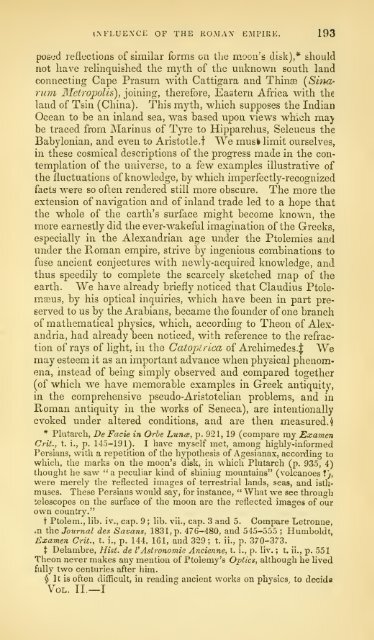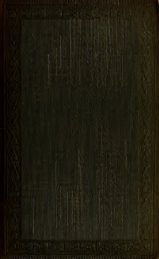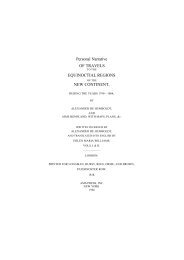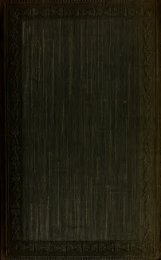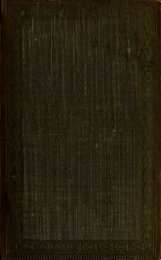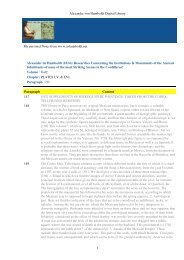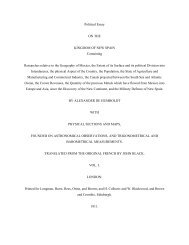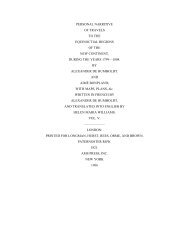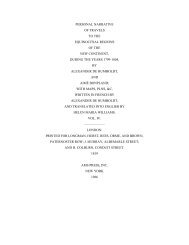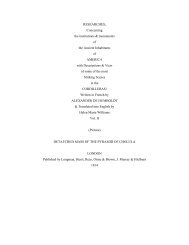See the complete document here
See the complete document here
See the complete document here
Create successful ePaper yourself
Turn your PDF publications into a flip-book with our unique Google optimized e-Paper software.
l.\FLUE\'CE OF THE KOxMAX EMPIRE. 193<br />
posc'd reflections of similar forms on <strong>the</strong> moon's disk),* should<br />
not have relinquished <strong>the</strong> myth of <strong>the</strong> unknown south land<br />
connecting Cape Prasum with Cattigara and Thinse [Sinarum<br />
]\Ietro2:)olis), joining, <strong>the</strong>refore, Eastern Africa with <strong>the</strong><br />
land of Tsin (China). This myth, which supposes <strong>the</strong> Indian<br />
Ocean to be an inland sea, was based upon views which ma)f<br />
be traced from Marinus of Tyre to Hipparchus, Seleucus <strong>the</strong><br />
Babylonian, and even to Aristotle. t We mus* limit ourselves,<br />
in <strong>the</strong>se cosmical descriptions of <strong>the</strong> progress made in <strong>the</strong> con-<br />
templation of <strong>the</strong> universe, to a few examples illustrative of<br />
<strong>the</strong> fluctuations of knowledge, by which imperfectly-recognized<br />
facts were so often rendered still more obscure. The more <strong>the</strong><br />
extension of navigation and of inland trade led to a hope that<br />
<strong>the</strong> whole of <strong>the</strong> earth's surface might become known, <strong>the</strong><br />
more earnestly did <strong>the</strong> ever-wakeful imagination of <strong>the</strong> Greeks,<br />
especially in <strong>the</strong> Alexandrian age under <strong>the</strong> Ptolemies and<br />
under <strong>the</strong> Roman empire, strive by ingenious combinations to<br />
fuse ancient conjectures with newly-acquired knowledge, and<br />
thus speedily to <strong>complete</strong> <strong>the</strong> scarcely sketched map of <strong>the</strong><br />
earth. We have already briefly noticed that Claudius Ptole-<br />
m.aeus, by his optical inquiries, which have been in part preserved<br />
to us by <strong>the</strong> Arabians, became <strong>the</strong> founder of one branch<br />
of ma<strong>the</strong>matical physics, which, according to Theon of Alexandria,<br />
had already been noticed, with reference to <strong>the</strong> refraction<br />
of rays of light, in <strong>the</strong> Catoptrica of Archimedes. t We<br />
may esteem it as an important advance when physical phenomena,<br />
instead of being simply observed and compared toge<strong>the</strong>r<br />
(of which we have memorable examples in Greek antiquity,<br />
in <strong>the</strong> comprehensive pseudo- Aristotelian problems, and in<br />
Roman antiquity in <strong>the</strong> works of Seneca), are intentionally<br />
evoked under altered conditions, and are <strong>the</strong>n measured. §<br />
* Plutarch, De Facie in Orbe Lunce, p. 921, 19 (compare my Examen<br />
Crit., t. i., p. 145-191). I have myself met, among higlilj-informed<br />
Persians, with a repetition of <strong>the</strong> hypo<strong>the</strong>sis of Agesianax, according to<br />
which, <strong>the</strong> marks on <strong>the</strong> moon's disk, in which Plutarch (p. 935, 4)<br />
thought he saw " a peculiar kind of shining mountains" (volcanoes ?),<br />
were merely <strong>the</strong> reflected images of terrestrial lands, seas, and isth-<br />
muses. These Persians would say, for instance, " What we see through<br />
telescopes on <strong>the</strong> surface of <strong>the</strong> moon are <strong>the</strong> reflected images of our<br />
own country."<br />
+ Ptolem., lib. iv., cap. 9 ; lib. vii., cap. 3 and 5. Compare Letronne,<br />
.n <strong>the</strong> Journal des Savans, 1831, p. 476-480, and 545-555 ; Humboldt,<br />
Examen Crit., t. i., p. 144. 161, and 329; t. ii., p. 370-373.<br />
X Delambre, Hist, de V Astronomic Ancienne, t. i., p. liv. ; t. ii., p. 551<br />
Theon never makes any mention of Ptolemy's Optics, although he lived<br />
two centuries after him.<br />
fully<br />
§ It is often difficult, in reading ancient works on physics, to deoida<br />
Vol. II.—I


